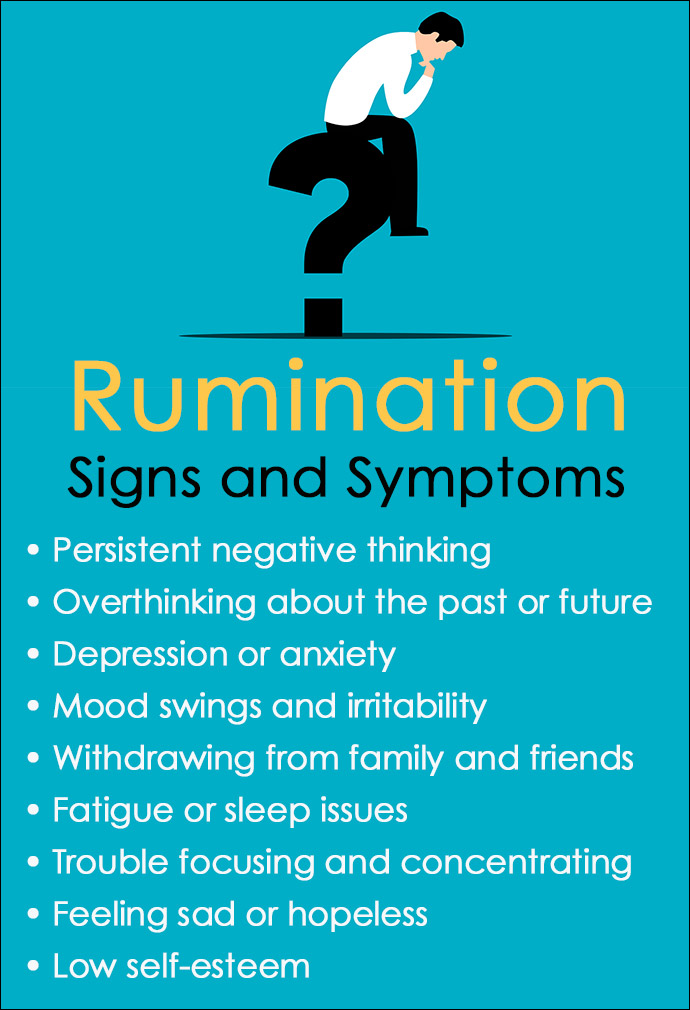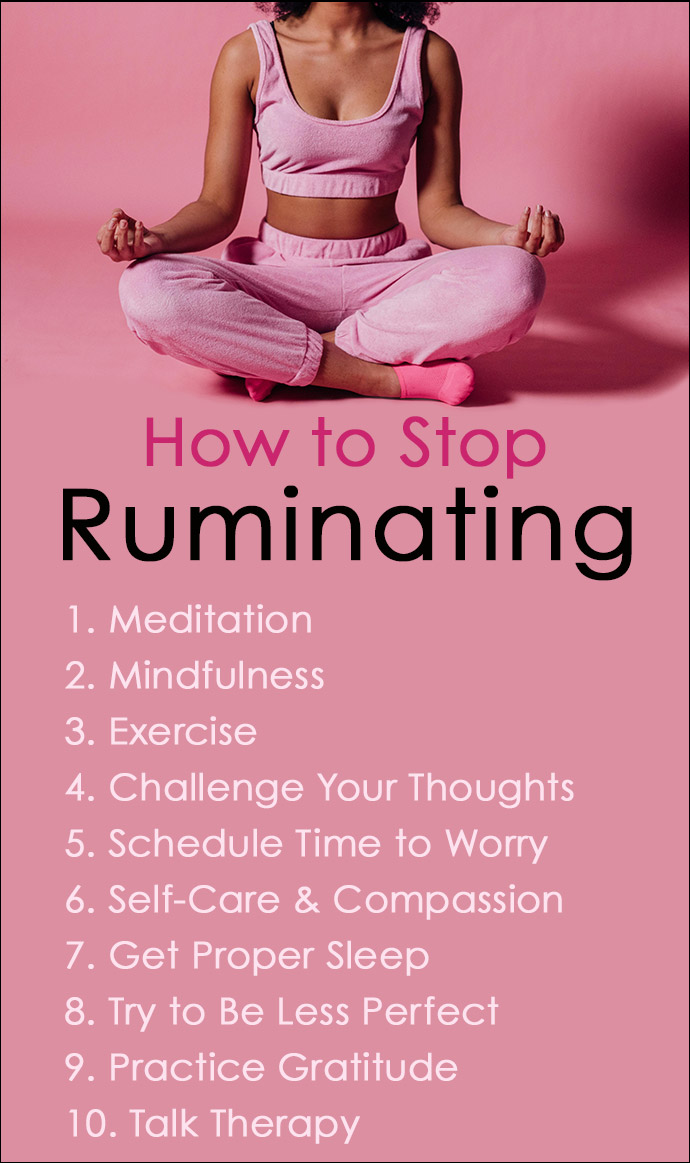Table of Contents
The endless cycle of negative thoughts and worries from rumination leads to depression and anxiety, so it’s necessary to identify the signs and learn how to stop ruminating.
There’s a quote attributed to the Chinese philosopher Laozi (Lao Tzu):
If you are depressed you are living in the past. If you are anxious you are living in the future. If you are at peace you are living in the present.
This quote nicely summarizes the effects of ruminating thoughts on mental health.
For many people, rumination becomes a deeply ingrained bad habit that takes an emotional toll on wellbeing. Breaking the habit requires understanding the causes, signs, and ways to stop ruminating thoughts as they occur.
What is Rumination?
Rumination is a continuous pattern of repetitive negative thoughts that dwell on bad past experiences, or unhealthy worrying about a future event.
The Cambridge Dictionary defines rumination as, “the act of thinking carefully and for a long period about something.”
While this may sound like it is a positive thing, it can also have negative connotations.
Dictionary.com defines ruminate as, “to meditate or muse; ponder.” But a secondary Psychology definition is, “to obsessively revisit the same thought or theme over and over again.
When we obsessively dwell on a thought, especially a negative or stressful one, it becomes a problem that can lead to mental health issues.
Rumination is more than occasionally thinking about something in the past or worrying about something in the future that hasn’t happened yet.
Ruminating thoughts have the following characteristics:
- Repetitive
- Excessive and obsessive
- Intrusive
- Unproductive
- Produces stress, worry, or regret
- Interferes with daily life
- Leads to depression or anxiety
What Causes Rumination and Ruminating Thoughts?
Rumination rarely has a single cause, and it is often related to a variety of reasons.
Ruminating thoughts can be caused by a combination of the following:
- Personality characteristics
- Biological factors
- Past experiences
- Cognitive difficulties
- Environmental issues
People who are perfectionists obsess over details and strive to make sure everything is always perfect. While this can sometimes be a good thing it isn’t always realistic and causes excess stress.
Others with low self-esteem dwell on similar issues, but for different reasons.
Some individuals who experienced social isolation, trauma, abuse, or stressful life events as a child or in the past tend to have frequent ruminating thoughts that interfere with their emotional quality of life.
Still others hope that rumination about their problems will offer a positive solution, but this simply leads to more stress, anxiety, or depression.
Regardless of the cause of rumination, persistent negative thinking and obsessive thoughts often lead to unhealthy mental health conditions.
Examples of Ruminating Thoughts
Ruminating thoughts take many forms and include repeatedly dwelling on a past event or obsessively worrying about something in the future that hasn’t happened yet.
Here are some rumination examples:
1. Endlessly dwelling on why a relationship ended and what circumstances caused it to end.
2. Feeling depressed about not being accepted to the college of your choice and relentlessly wondering if it was caused by poor SAT scores.
3. Ruminating about what to wear to an upcoming wedding and obsessively stressing about whether your outfit will clash with the bride’s dress.
4. Being miserable about not receiving an employment offer and fixating on whether it was caused by the wrong answers at the interview.
5. Excessively worrying about being able to pay rent each month.
6. Beating yourself up about a comment you made at a friend’s party.
7. Being mentally consumed about having an old car and fearing that others will think you are poor.
It’s normal to think about these events or situations. But when occasional thinking turns to repeated and unnecessary worry in an unproductive way that can’t be controlled, it is considered rumination.
Signs and Symptoms of Rumination
The signs and symptoms of rumination will vary for each individual and may depend on a number of factors.
Signs of ruminating thoughts include:
- Persistent negative thinking
- Overthinking about the past or future
- Depression or anxiety
- Mood swings and irritability
- Withdrawing socially from family or friends
- Fatigue or negative sleep issues
- Trouble focusing or concentrating
- Feeling sad or hopeless
- Low self-esteem
It’s difficult to overcome a cycle of persistent, repetitive thinking, and if it isn’t properly managed, it can become worse over time.
The most important aspect is to recognize the signs of ruminating thoughts as they occur in order to change or avoid unhealthy thinking patterns.
Rumination and Mental Health
Ruminating thoughts can become a serious problem if not managed or controlled.
In addition to being a root cause of anxiety, depression, and other mental health conditions, it can also lead to other emotional issues.
The most common mental health conditions related to rumination include:
- Anxiety Disorders
- Depression
- Obsessive-Compulsive Disorder (OCD)
- Post-Traumatic Stress Disorder (PTSD)
- Eating Disorders
- Substance Use Disorders
Depression
Ruminating thoughts are closely tied to many kinds of depression. Repetitive negative thinking about past events and experiences can cause feelings of sadness, hopelessness, and low self-esteem, which are common depressive symptoms.
Anxiety Disorders
Rumination and uncontrollable worry about future events are common signs of generalized anxiety disorder and other types of anxiety. Excessive overthinking about what might happen makes it difficult to envision a positive outcome.
Obsessive-Compulsive Disorder (OCD)
With many types of OCD, repeated obsessive thoughts and compulsive behaviors create self-doubt and unrealistic fears that would not occur with normal, rational thinking.
Post-Traumatic Stress Disorder (PTSD)
While there are different types of PTSD, many of them cause ruminating thoughts about traumatic events that happened in the past and may lead to anger, guilt, shame, fear, or blame.
Eating Disorders
Eating disorders like anorexia and bulimia cause excessive worry and negative thoughts regarding weight, body image, and ways to become thinner. Repetitive overthinking usually focuses on food and eating behavior.
Substance Use Disorders
Rumination has a strong connection to substance use disorders because people use drugs and alcohol as a coping mechanism for other mental health issues like anxiety, depression, and PTSD.
Ruminating thoughts may be the catalyst for the mental health conditions that lead to addiction.
How to Stop Ruminating
Learning how to stop ruminating is only half the battle. It’s crucial to put the various methods into action and be determined to practice them regularly. It can take time to gain control of unhealthy thinking but it’s worth the effort.
Here are effective ways to stop ruminating:
1. Meditation
Meditation can be one of the most effective tools for learning how to stop ruminating. Practicing this technique involves sitting alone in a quiet place while your mind focuses only on one thing, such as your breath.
If the mind wanders to other thoughts, recognize it, and gently bring it back to focusing only on breathing. This trains the brain to identify ruminating thoughts as they occur to reduce negative thought patterns.
2. Mindfulness
Mindfulness is similar to meditation, but it can be performed while doing other activities.
For example, when washing the dishes after a meal, the mind should only think about cleaning the dishes, and nothing else. Pay attention to the smell of the dish soap, the temperature of the water, and how hard you are scrubbing.
Like with meditation, if the mind starts thinking about other things, notice that it got sidetracked and bring it back to only focusing on washing the dishes.
3. Exercise
Exercise is one of the best ways to reduce stress, anxiety, and depression, and it is also very effective for overcoming rumination. By decreasing anxiety and depression, it will improve mood and allow the mind to take a healthier approach to dealing with negative thoughts and behaviors.
Regular exercise for at least 30 minutes a day, four or five days a week is ideal. Walking is a good place to start and exercises like yoga are even better because they target both the mind and body.
4. Challenge Your Thoughts
When ruminating thoughts arise it’s helpful to analyze them and decide if they are positive or negative. If they are not helpful or do not have merit, label them as unrealistic and try to turn them around so they offer some value.
5. Schedule Time to Worry
People who struggle with rumination are consumed by it at all hours of the day and night. Some things, like paying the bills, are a constant source of worry for many people. But stressing about them during the day is not helpful.
Schedule one night a week to address the issue of paying bills and free your mind of ruminating about them until the scheduled time.
6. Practice Self-Care and Compassion
Learn to practice self-care and talk to yourself in a compassionate way. Know that you are not a broken person, you simply have broken thoughts.
Being kind to yourself will free your mind of unhealthy thoughts and make it easier to learn how to stop ruminating.
7. Get Proper Sleep
Without proper sleep, the mind does not think clearly and it can cause rumination to go into overdrive.
Keeping a consistent sleep schedule and getting 7 to 8 hours of sleep each night can reduce the stress, anxiety, and depression that lead to ruminating thoughts.
8. Try to Be Less Perfect
This applies to everyone but especially to perfectionists. Nobody is perfect and consciously allowing yourself to make some mistakes will create a less stressful life.
Striving to do your best at all times will improve self-esteem and lessen thoughts of rumination.
9. Practice Gratitude
Practicing gratitude on a regular basis and being grateful for all the positive things in your life is a good antidote for rumination. It’s difficult to have negative thoughts when you notice all the good around you.
10. Talk Therapy
If learning how to stop ruminating on your own isn’t working, it can be beneficial to consider talk therapy with another person.
There’s no shame in seeking professional help and treatment approaches like Cognitive Behavioral Therapy and Gestalt Therapy techniques that focus on the present moment instead of the past are well-suited for overcoming rumination.
Talking to friends or family members can also be beneficial for gaining a different perspective on negative thoughts.
Frequently Asked Questions
Is Rumination a Mental Illness?
No, rumination is not classified as a mental illness, but it is a common symptom of mental health conditions like depression, anxiety disorders, addiction, OCD, and PTSD.
It is sometimes thought of as a mental processing disorder characterized by obsessive and repetitive thinking, known as ruminating.
Even though it is not a mental illness, it plays an important role in our thoughts and emotions and can worsen existing symptoms or increase the risk of developing other mental health issues.
How does rumination differ between depression and anxiety?
Rumination is a characteristic of both depression and anxiety, but there are differences in the role it plays with each one.
With depression, ruminating thoughts focus on negative past experiences or failures. This causes a person to excessively worry about why something bad happened or what they could have done differently.
In the case of anxiety, rumination causes a person to be stressed and anxious about future situations or events that haven’t happened yet.
Does anxiety cause rumination or do ruminating thoughts cause anxiety?
In essence, both cases can be true since anxiety can cause rumination, and ruminating thoughts can cause anxiety.
Ruminating thoughts and persistent, needless worry can lead to anxiety disorders, or at the very least, increase the risk of developing anxiety. For people already struggling with anxiety, rumination can aggravate or enhance the symptoms.
People with existing anxiety disorders have a higher likelihood of obsessing or ruminating about their worries and stressors than those without anxiety. Anxiety disorders are also a common trigger for rumination.
For these reasons, rumination can be both a cause and symptom of anxiety disorders.
Does rumination play a role in addiction or addiction recovery?
Yes, rumination can play a significant role in both addiction and addiction recovery.
Rumination has a strong connection to anxiety and depression, and both are risk factors for substance abuse and addiction.
Drugs and alcohol are commonly used as coping mechanisms for negative thoughts and emotions.
Much like anxiety, ruminating thoughts can be both a cause and a symptom of addiction.
In addition, unresolved rumination can have a negative impact on recovery, and persistent, obsessive thought patterns may trigger relapse.
Fortunately, successfully treating and overcoming rumination can also have a positive effect on addiction recovery.





